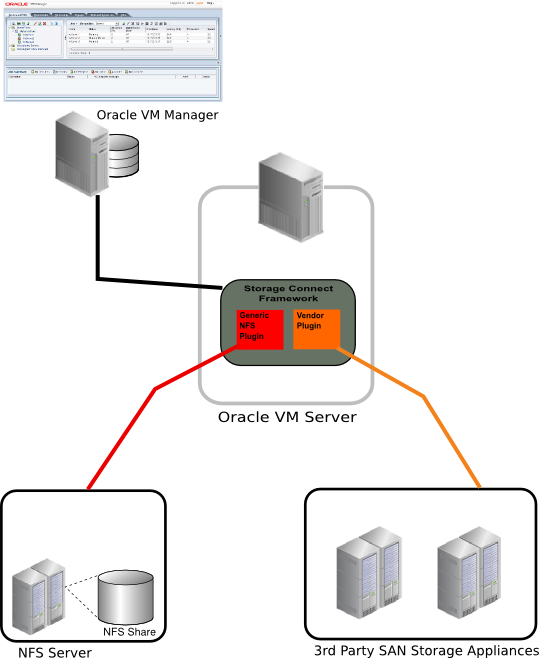Oracle VM Manager communicates
with all storage through a set of plug-ins, which are part of the
Storage Connect framework. These plug-ins are not actually run
from the Oracle VM Manager but rather live on some or all of the
Oracle VM Servers.
You can see these plug-in files in the local file system of an
Oracle VM Server in the /opt/storage-connect/
directory. In the Oracle VM Manager Web Interface you select an available plug-in when
creating and configuring storage elements for use in your
environment.
The Oracle VM Storage Connect framework provides a storage discovery and provisioning API that enables the provisioning and management of storage platforms directly from within Oracle VM Manager. The abstraction provided by the Storage Connect framework allows administrators to perform provisioning operations without the need to know the specific behavior of any storage platforms that are being used within the Oracle VM infrastructure. The Storage Connect API allows third party storage vendors to develop their own Oracle VM Storage Connect plug-ins that enable their storage appliances to interface with the Storage Connect framework.
Storage elements are logically divided in File Servers and SAN Servers. This distinction refers to the difference between file-based storage and block-based storage, or raw disks. Both types of storage are handled using Oracle VM Storage Connect plug-ins. The Oracle VM Storage Connect framework is able to present the capabilities of these two different types of storage facilities in a similar way, and a user would need to have only basic knowledge of storage to be able to manage either of them.
Oracle VM Storage Connect plug-ins are split up according to the functionality they offer: there are generic plug-ins and non-generic plug-ins, also referred to as vendor-specific plug-ins. Generic plug-ins offer a limited set of standard storage operations on virtually all storage hardware, such as discovering and operating on existing storage resources. We categorize these operations as 'passive' in the sense that they do not interact with the storage management but simply detect the available storage architecture and allow it to be used in the Oracle VM environment.
Vendor-specific plug-ins include a much larger set of operations, which also includes direct, active interventions on the storage hardware: clone, create LUNs, resize, and so on. To execute generic storage plug-in operations, only an access host or fibre channel connectivity is required (for iSCSI: typically a host name or IP address with a port number). The non-generic plug-in operations require an additional admin host, with optional administrative user name and password, granting Oracle VM Servers, with the appropriate plug-in installed, direct access to the configuration of the storage hardware.
The following generic plug-ins are included with Oracle VM Server and work with Oracle VM Manager:
Oracle Generic NFS Plug-in.
Oracle Generic SCSI Plug-in.
To install vendor-specific plug-ins, see Installing Oracle VM Storage Connect plug-ins in the Oracle VM Administrator's Guide .


